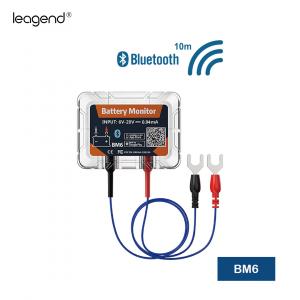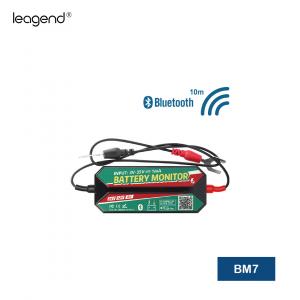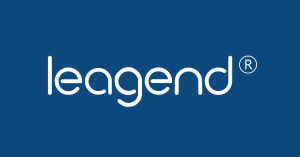leagend Leads Smart Battery Monitoring Innovation with BM6 and BM7
leagend, a pioneer in battery management innovation, has had two cutting-edge products to its smart battery monitoring portfolio for over 20 years.
Meeting Evolving Power Management Requirements
With industries placing greater emphasis on preventive maintenance and operational reliability, the need for continuous, connected battery health monitoring has become more prominent. Both leagend BM6 and leagend BM7 are designed to support users ranging from vehicle owners and workshop operators to backup power system managers by providing real-time data on battery voltage, charge condition, and system performance.
BM6: Focused Monitoring for 12V Systems
leagend BM6 is engineered for use with 12V lead-acid and LiFePO4 starter batteries, making it suitable for personal vehicles, motorcycles, and maintenance workshops. The device supports the simultaneous monitoring of up to four batteries via a Bluetooth connection and a dedicated mobile application.
In addition to standard voltage and temperature monitoring, leagend BM6 records trip and parking activity data, including route history, fuel cost estimates, and parking locations, accessible through integrated map functionality. The monitor also performs system health checks, alerting users to abnormalities in starting and charging systems.
The device features IP67 waterproof protection and maintains a low standby current consumption (average 0.94mA), enabling long-term, continuous use without significant power draw. Data is stored at two-minute intervals for up to 72 days and can be exported for further analysis.
leagend BM7: Multi-Voltage Support for Mixed Fleet and Energy Systems
leagend BM7 extends functionality by offering compatibility with 6V, 12V, and 24V battery systems, covering a wider range of applications including commercial vehicles, marine vessels, forklifts, recreational vehicles, and residential solar energy storage.
Similar to leagend BM6, leagend BM7 enables real-time Bluetooth monitoring, trip logging, parking navigation, and remote supervision of multiple batteries. It performs automatic system health checks and provides voltage readings with an accuracy of ±0.03V, supporting critical power systems in demanding environments.
Designed to operate in temperatures from -30°C to 85°C, leagend BM7 is suited for harsh field conditions, further broadening its application scope across industrial and outdoor sectors.
Product Selection Based on System Requirements
While both monitors provide Bluetooth-based real-time monitoring and system analysis via a mobile application, the difference lies in their voltage compatibility and intended use. leagend BM6 is intended for environments where 12V systems are the standard, such as automotive maintenance and personal vehicle use. In contrast, leagend BM7 is positioned for users managing multi-voltage assets, including trucks, boats, backup power systems, and mixed energy storage applications.
Supporting the Transition to Smarter Power Management
As connected monitoring solutions gain traction in automotive and energy storage sectors, the leagend BM6 and the leagend BM7 contribute to improved battery system visibility and early fault detection, helping users reduce unexpected failures and maintenance costs.
About leagend
Founded in 2005, leagend specializes in the development of battery testing, monitoring, and diagnostic technologies for automotive, marine, and industrial applications. The company’s portfolio includes handheld battery testers, Bluetooth-enabled monitors, multi-step smart chargers, and OBD II diagnostic tools.
leagend’s products are recognized for precision, durability, and low power consumption, serving professional users and system integrators in both domestic and international markets. Through continuous product development, the company supports the growing demand for intelligent, efficient, and reliable battery management solutions.
Arthur Kingsly
SHENZHEN LEAGEND OPTOELECTRONICS CO., LTD.
+86 755 8282 1859
email us here
Visit us on social media:
LinkedIn
Facebook
X
Legal Disclaimer:
EIN Presswire provides this news content "as is" without warranty of any kind. We do not accept any responsibility or liability for the accuracy, content, images, videos, licenses, completeness, legality, or reliability of the information contained in this article. If you have any complaints or copyright issues related to this article, kindly contact the author above.
BOI Launches THECA 2025 to Position Thailand as Asia’s Most Comprehensive Electronics Ecosystem
Arab America Foundation Announces Speakers for CONNECT Empowerment Summit in New York/New Jersey, October 24-25, 2025
Hospital-acquired Bedsore and Death Claim Filed Against Alabama Hospitals
Więcej ważnych informacji
 Jedynka Newserii
Jedynka Newserii

 Jedynka Newserii
Jedynka Newserii

Prawo

Kolejne polskie miasta chcą być przyjazne dzieciom. Planują stworzyć najmłodszym dobre warunki do rozwoju
Cztery miasta w Polsce posiadają tytuł Miasta Przyjaznego Dzieciom nadany przez UNICEF Polska. Dziewięć kolejnych miast czeka na certyfikację, a w ostatnich miesiącach do programu zgłosiło się kilka następnych. Na całym świecie inicjatywa została przyjęta już w ponad 4 tys. samorządów, a w Hiszpanii objęła połowę dziecięcej populacji miast. Program UNICEF-u ma na celu zachęcenie włodarzy do traktowania najmłodszych obywateli w sposób podmiotowy, respektowania ich praw i zaproszenia ich do współdecydowania o przyszłości.
Przemysł
W ciągu roku w Polsce ubyło 500 przedsiębiorstw odzieżowo-tekstylnych. Problemem są spadki zamówień z Europy Zachodniej i wzrost kosztów

Wartość rynku odzieżowego w Polsce wynosi 66,9 mld zł, z czego 10 mld zł to wartość krajowej produkcji – wynika z danych PIOT. Od czasu pandemii branża mierzy się z szeregiem wyzwań, wśród których najpoważniejsze to wzrost kosztów pracy i produkcji, przerwane łańcuchy dostaw i spadek zamówień – zarówno w kraju, jak i za granicą, a także wzrost nieuczciwej konkurencji na rynku, czyli głównie importu z Chin. Skala wyzwań sprawia, że w ubiegłym roku z rynku zniknęło 500 firm. Producenci odzieży apelują do rządu o wsparcie.
Handel
D. Obajtek: Orlen powinien być o 30–40 proc. większą spółką. Byłoby to z korzyścią dla konsumentów

Orlen jest największym polskim przedsiębiorstwem. Jego przychody ze sprzedaży w 2024 roku wyniosły blisko 295 mln zł, a rok wcześniej – ponad 372 mln – wynika z raportu Rzeczpospolitej „Lista 500”. W ubiegłorocznym rankingu Fortune 500 uwzględniającym największe korporacje znalazł się na 216. miejscu na świecie i 44. w Europie. Według Daniela Obajtka, europosła PiS-u i byłego prezesa Orlenu, spółka powinna jeszcze urosnąć, tym samym gwarantując konsumentom szereg korzyści, a także przyspieszać inwestycje m.in. w obszarze petrochemii i energetyki zero- oraz niskoemisyjnej.
Partner serwisu
Szkolenia

Akademia Newserii
Akademia Newserii to projekt, w ramach którego najlepsi polscy dziennikarze biznesowi, giełdowi oraz lifestylowi, a także szkoleniowcy z wieloletnim doświadczeniem dzielą się swoją wiedzą nt. pracy z mediami.












.gif)

 |
| |
| |
|